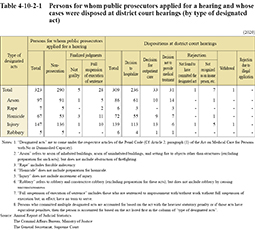Section 2 Medical Care and Treatment System for Mentally Ill
The medical care and treatment system for the mentally ill covers, [1] a person who has committed a designated act (arson, forcible indecency, rape, homicide and robbery, including attempting to commit these offenses, and injury) but a public prosecutor has decided not to prosecute the person for reason of insanity or diminished capacity at the time of the act, and [2] a person who was either sentenced not guilty on the grounds of insanity or received a mitigated sentence on the grounds of diminished capacity at the time of the designated act (excluding a person who was sentenced to imprisonment without full-suspension of execution), and whose judgment has been finalized.
A hearing for both [1] and [2] will be held by a panel, consisting of a judge and a mental health expert (psychiatrist), in a district court, basically in response to an application by a prosecutor, which determines necessity and contents of medical treatment in accordance with the Act on Medical Care and Treatment for Persons Who Have Serious Cases Under the Condition of Insanity (Act No. 110 of 2003). At a hearing, the panel may request a director of a probation office to research living conditions of those persons.
Table 4-10-2-1 shows the trend in the number of persons for whom public prosecutors applied for a hearing and the number of persons whose cases were conclusively disposed at the hearing, and those numbers by type of designated act in 2020.
Table 4-10-2-1 Persons for whom public prosecutors applied for a hearing and whose cases were disposed at district court hearings (by type of designated act)
Click here for the Excel file (Japanese)
Those for whom it is decided at a hearing that there is a need for hospitalization are hospitalized in designated inpatient care hospitals (designated by the Minister of Health, Labour and Welfare. As of April 1, 2021, there were 33 designated inpatient care hospitals nationwide (Source: Social Welfare and War Victims’ Relief Bureau, Ministry of Health, Labour and Welfare).) where they receive specialized medical care in accordance with the system.
The managers of designated inpatient care hospitals are required to apply for a confirmation every six months of the need for subject persons to be hospitalized. They are also required to apply for discharge of subject persons from the hospitals immediately after it is deemed no longer necessary for them to be hospitalized to receive medical care.
Those who receive a decision by a panel on their need for outpatient treatment or permission to be discharged from a hospital must then receive outpatient medical care at a designated outpatient care hospital (designated by the Minister of Health, Labour and Welfare. As of April 1, 2021, there were 3,854 designated outpatient care hospitals nationwide (Source: Social Welfare and War Victims’ Relief Bureau, Ministry of Health, Labour and Welfare).) for three years, in principle, and are placed under mental health supervision by probation offices during the period, which aims to secure continuous medical care.
